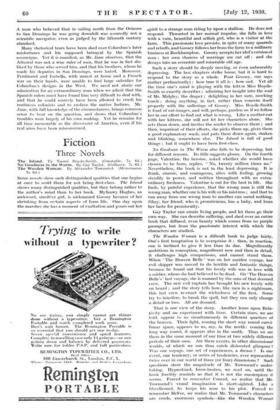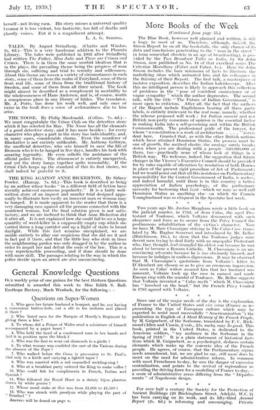Fiction
Three Novels
SOME novels show such distinguished qualities that one begins at once to scold them for not being first-class. The Island shows many distinguished qualities, but they belong rather to the author's mind than to her book. Myfanwy Hughes, an awkward, sensitive girl, is nicknamed Goosey because of her shrinking from certain aspects of farm life. One day upon the marshes she has a moment of exaltation and- pours out her
spirit to a strange man riding by upon a stallion. He does not respond. Thwarted in her normal impulse, she falls in love with a vain, beautiful and selfish girl, who is a visitor at the farm. This passionate love persists, in spite of many quarrels and rebuffs, and Goosey follows her from the farm to a millinery business at Rockhampton. Goosey accepts her idol's version of man : her own chances of marriage are cut off : and she decays into an eccentric and miserable Old age.
Such a story should be deeply moving, or even unbearably depressing. The last chapters strike home, but it is hard to respond to the story as a whole. Poor Goosey, one says (rather perfunctorily) : how true it all is : how-sad. Yet all the time one's mind is playing with the kitten Miss Royde- Smith so exactly describes ; admiring her insight into the soul of Mr. Midgley, the draper ; delighting in her sure, mocking touch ; doing anything, in fact, rather than concern itself properly with the sufferings of Goosey. Miss Royde-Smith is fond of cat-images, and will, perhaps, pardon us if we follow ber in our effort to find out what is wrong. Like a mother-cat with her kittens, she will not let her characters alone. She sets them down, and invites the reader to observe them ; and then, impatient of their-efforts, she picks them up, gives them a good explanatory wash, and puts them down again, shaken and blinking, somewhere else. The Island is full of good things ; but it ought to have been first-class.
No Goodness in The Wo.rni also fails to be depressing, but for different reasons. Its title suggests gloom. On the fourth page, Valentine, the heroine, asked whether she would have chosen to be born, replies, "No, twenty million times no." Nevertheless, the book is not in the least depressing. It is frank, sincere, and courageous, alive with feeling, growing steadily in power, and written throughout with an extra- ordinary freshness. Valentine is out for the best in life. She finds, by painful experience, that the wrong man is still the wrong man, whether one is his wife or his mistress ; and that to run away from one wrong man to another can mend nothing. Sikey, her friend, who is promiscuous, has a baby, and loses her taste for promiscuity.
Gay Taylor can create living people, and let them go their own way. She can describe suffering, and shed over an entire book that diffused, even beauty which conies from no purple passages, but from the passionate interest with which the characters are studied.
The Wooden Woman is a difficult book to judge fairly. One's first temptation is to overpraise it : then, in reaction, one is inclined to give it less than its due. Magnificently ambitious in conception, magnificent now and then in detail, it challenges high comparisons, and cannot stand them. When • The Heaven Belle' was on her maiden voyage, her evil skipper was moved to do terrible and fantastic things, because he found out that his lovely wife was in love with a soldier, whom she had believed to be dead. On 'The Heaven Belle's' last voyage, she is manned by the sons of that doomed crew. The new evil captain has brought his new lovely wife on board ; and the story tells how, like men in a nightmare, this last crew re-enact the wickedness Of the first. Some try to interfere, to break the spell, but they can only change a detail or two. All are doomed.
That is one view of the story. Another leans upon Rela- tivity and an experiment with time. Certain stars, we are told, appear to us simultaneously in different quarters of the heaven. Their light, coming the short way round curvi- linear space, appears to us, say, in the north: coming the long way round, it appears also in the south. Thus we see them in the same moment of our time at two widely different periods of their own. Are there events, in other dimensional worlds, of which we can thus catch dislocated glimpses ? Was one voyage, one set of experiences, a dream ? Is one event, one tendency, or series of tendencies, ever represented twice over in our world of three (or four) dimensions ? Such questions show the magnitude of Mr. Townsend's under- taking. Hypnotized, brow-beaten, we read on, until the book forcibly reminds us that it is not the masterpiece it seems. Forced to remember Conrad, we realize that Mr. Townsend's visual imagination is short-sighted. Like a bloodhound, he keeps his nose to his plot. Forced to remember- MeFee, we realize that Mr. Townsend's characters are crude, enormous symbols—like - the -Wooden Woman herself—not living men. His story misses a universal quality lecause it is too- viOlent, too fantastic, too full of deaths and ghostly voices. But it is a magnificent attempt.
L. A. G. STRONG.





































 Previous page
Previous page